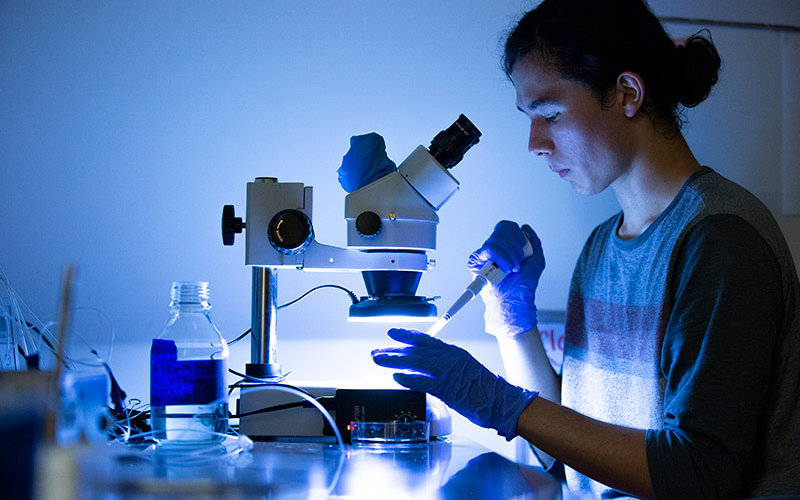
Trevor Zimmerman-Thompson carefully places the petri dish under the lens of the microscope, picks up the syringe of mustard oil and squirts a little into the dish.
Then he watches the magic happen.
Tens of tiny zebrafish larvae react to the oil and move rapidly. Done over a period of time, the tiny microscopic creatures are soon trained to change their behavior — as the junior psychology major intended.
Similar to what Russian physiologist Ivan Pavlov found in his 1890s study with dogs, Zimmerman-Thompson is finding with zebrafish larvae. They can be trained to behave in a certain way, even when the stimulus is no longer there.
“It might seem trivial and unimportant to train a fish to respond to an innocuous stimulus, but the neural changes that mediate this form of learning in fish are probably similar to the mechanisms that allow humans to learn calculus or understand how the universe works,” says Zimmerma-Thompson about the research.
Such research has become a passion for the Cal State Fullerton student, who developed a love for psychology and statistics in high school but without the desire to become a counselor.
His interest in psychology was revived when he discovered the campus opportunities to conduct research and became involved with the Maximizing Access to Research Careers (MARC) Scholar program. The 23-year-old, federally funded program has opened the eyes of more than 100 underrepresented and/or first-generation college students to opportunities for future careers in research.
The MARC program is intense and rigorous, but all for a purpose. It sets the stage for grad school. — Shaina Nguyen
Program participants, all juniors and seniors, are required to complete specific science courses, including upper-division scientific writing classes, as well as conduct an average of 15 hours of research per week during the academic year. Scholars receive an annual stipend of $13,000, as well as funding for travel, supplies and materials. MARC also provides a partial tuition waiver.
During the first summer of the two-year program, the scholars spend eight weeks in the lab full-time under the guidance of their campus faculty mentor and attend a six-week-long MARC boot camp where they prepare for the demands of the MARC scholars program and are introduced to program best practices. The resulting research eventually culminates in a senior thesis that they defend before a thesis committee at the end of the program.
During the second summer of the program, MARC Scholars conduct research at a doctoral-granting institution.
“The idea,” says Amybeth Cohen, program director and professor of biological science, “is to give them the preparation to compete for slots at the top schools in the country.”
Zimmerman-Thompson’s sentiments and new-found passion for research are echoed by all seven of this year’s incoming scholars, including Shaina Nguyen, a junior biochemistry major who studies small molecule inhibitors — substances that are able to enter cells easily and can affect other molecules — as potential therapeutics in the battle against the West Nile virus.
“The MARC program is intense and rigorous, but all for a purpose,” said Nguyen. “It sets the stage for grad school.”
“It’s definitely a hard road, but it’s the fast track to where you want to go,” stressed Zimmerman-Thompson.
This year’s class of MARC Scholars, their majors and mentors:
Vanessa Bruno, psychology
Mentor: Aaron Lukaszewski, assistant professor of psychology
Kellen Henning, biological science
Mentor: Melanie Sacco, associate professor of biological science
William Kim, biological science
Mentor: Hope Johnson, professor of biological science
Shereen Lam, biological science
Mentor: Kristy Forsgren, associate professor of biological science
Kimberly Lopez-Zepeda, Chemistry
Mentor: Nina Robson, associate professor of mechanical engineering
Shaina Nguyen, biochemistry
Mentor: Nicholas Salzameda, associate professor of chemistry and biochemistry
Trevor Zimmerman-Thompson, psychology
Mentor: Adam Roberts, assistant professor of psychology